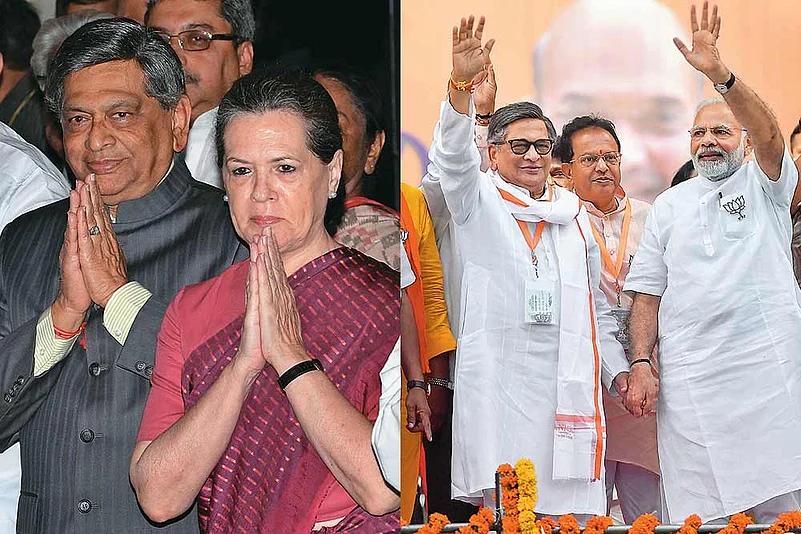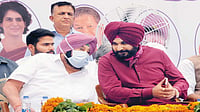Congress old-timers often described their organisation—some still do—as a bheed or crowd of people sharing no common ideology or personal fondness. Patronage and a share of the power pie that the party could once guarantee glued the swarm together. For a little over five years, the crowd has been dispersing; taking refuge with new benefactors. The reason is obvious. PM Narendra Modi and Amit Shah’s aggressive BJP has reduced its main rival to a caricature of its former self, federally. Congress bastions in most states have crumbled.
Of course, party-hopping, or the more colloquial but laconic catchphrase Aaya Ram, Gaya Ram, isn’t a new addition to the well-entrenched tradition of political opportunism. But, there’s a curious twist at play here, particularly with leaders who have jumped onto the BJP bandwagon, the favourite sanctuary for most hoppers irrespective of their political stature.
Barring notable exceptions like Himanta Biswa Sarma, Mukul Roy and Baijayant ‘Jay’ Panda, who quit the Congress, Trinamool Congress and the Biju Janata Dal respectively to join the BJP over the past four years, and a few others, most turncoats have been handed tickets to obscurity by the Modi-Shah duo. Some like Union minister Rao Inderjit Singh enjoy half-hearted patronage of the party that now controls the reins of a major chunk of India’s political landscape. Most others have no share of the pie.
Consider the case of S.M. Krishna. The 87-year-old leader had joined the BJP in January 2017, ending his over three-decade association with the Congress. A towering Vokkaliga leader and face of the state’s Congress unit for nearly 20 years, Krishna served in the governments of Indira and Rajiv Gandhi, was chief minister of Karnataka, governor of Maharashtra, and finally the gaffe-prone foreign minister in Manmohan Singh’s UPA-II. He is now a margdarshak for the BJP in Karnataka—the peril of the title can be gauged simply by summoning the image of L.K. Advani.
Krishna isn’t alone in the BJP’s ‘mahagathbandhan’ of turncoats and the realm of political oblivion that his new party has cast him into isn’t a lonely place either. Remember Daggubati Purandeswari—former Union minister in the UPA government and daughter of arguably the most iconic political figure of Andhra Pradesh in contemporary political history, N.T. Rama Rao? Purandeswari had taken the saffron vow in 2014 just ahead of the Lok Sabha polls. The bifurcation of Andhra Pradesh predicted certain doom for the Congress and Purandeswari must have hoped that the Modi wave would help her stay afloat in the ensuing electoral tsunami. It didn’t.
Andhra Pradesh transferred its political reins in 2014 from the Congress to the Telugu Desam Party (TDP)—a party founded by Purandeswari’s father but later under control of her brother-in-law and rival, N. Chandrababu Naidu—and then to Jaganmohan Reddy’s nine-year-old YSR Congress this May. Though the BJP has obliged Purandeswari by fielding her as its candidate in the past two Lok Sabha polls (she lost both times), the erudite leader who can speak five languages got little else going for her in the parivar.
As the Congress’s stocks began to crash at the electoral sensex, beginning 2014, the BJP went poaching for anyone ready to abandon ship. Some served their purpose by helping the saffron outfit get faces in states or constituencies where it had little presence.

Krishna Tirath shifted from Congress to BJP and then hopped back; NTR’s daughter Purandeswari has little going for her in the BJP parivar.
Others simply bolstered the saffron ranks and were then quickly dispensed with. Joining the list of expendables with Krishna and Purandeswari are the likes of former Uttarakhand chief minister Vijay Bahuguna, Satpal Maharaj, Birender Singh, Yashpal Arya (all Congress heavyweights till five years ago), former MPs Naresh Agarwal, Arjun Charan Sethi and Jithender Reddy, and over three dozen legislators from across states who put on the saffron cloak of political invisibility.
In northeastern states, a seemingly insurmountable territory for the BJP before the dawn of the Modi-Shah era, the party poached entire blocks of Congress legislators. Arunachal Pradesh chief minister Pema Khandu and his Manipur counterpart N. Biren Singh as well as their cabinet colleagues were all Congress members till just three years ago. Evidently, Khandu and Singh or former Congress leader Himanta Biswa Sarma, now the BJP’s chief marshal for its northeastern conquest, have enjoyed status quo or had better innings in their new party than the scores of other Aaya Rams.
Despite censures from the high command for frequently embarrassing them by his facetious comments against Modi, Congress veteran Mani Shankar Aiyar has remained loyal to his party for nearly three decades, except for a four-week spell in early 1998 when he walked out to cofound the Trinamool Congress with Mamata Banerjee. With a sense of history, and perhaps borrowing from his own experience, Aiyar had once termed turncoats of his party as “carpetbaggers” who clamber on to the Congress wagon in victory. “Those who leave the Congress either have a short shelf life in some non-Congress government or soon write themselves out of history,” Aiyar said, citing examples of stalwarts like Jagjivan Ram, Hemwati Nandan Bahuguna, Devakanta Barooah, V.P. Singh, Arun Nehru and Arif Mohammad Khan—all leaders who “purchased their one-way ticket to obscurity” few years after they “ditched” the Congress.
In contrast, the Congress too has not just been an eager recipient of leaders from political rivals, but also generous in returning the favour. During the assembly polls to three states last December, Rahul Gandhi frequently assured his party workers that leaders who walked into Congress from other parties will have to dedicate five years of service to the organisation before hoping for a ticket.

Mukul Roy, Himanta Biswa Sarma, and Baijayant ‘Jay’ Panda are flourishing with the BJP.
The Congress president’s hypocrisy was exposed soon after. In Rajasthan, former BJP MP Manvendra Singh joined the Congress and contested unsuccessfully against Vasundhara Raje (he contested the recent Lok Sabha polls too on a Congress ticket and lost). In Madhya Pradesh, BJP stalwart Sartaj Singh and Sanjay Masani (Shivraj Chauhan’s scam-tainted brother-in-law) walked out of the BJP fold after being denied tickets and were promptly fielded as Congress candidates (both lost). In the Lok Sabha elections, the likes of Savitribai Phule, Sher Singh Ghubaya, Manish Khanduri and Ashray Sharma entered the Congress one day and were fielded as candidates the next. Often at the cost of its loyalists, the Congress has always rolled out the red carpet for party-hoppers. From Raj Babbar to Sanjay Nirupam, Siddaramaiah and Beni Prasad Verma (now back in the Samajwadi Party), the Congress has countless examples of hoppers who have come within its fold from rival outfits and been given prominent roles in the organisation.
A senior leader from a hill state who had switched from the Congress to the BJP three years back amid much fanfare, but finds himself sidelined now, tells Outlook: “For the BJP, accepting leaders from other parties is all about depleting the strength of the rival. Once that purpose is fulfilled, they discard you. Himanta, Mukul (formerly with the Trinamool) and Jay Panda (once Naveen Patnaik’s confidante) are important in the BJP now because they can get winnable candidates from the Northeast, Bengal and Odisha into its fold.”
Former Union minister Krishna Tirath who joined the BJP in 2015 and unsuccessfully contested the Delhi assembly polls returned to the Congress ahead of the Lok Sabha polls. She called her four-year stint in the BJP “an accident”. “Members of other opposition parties may be tolerated by the BJP, but those who go there from the Congress are always looked at with suspicion even if they work sincerely to build the party,” she says.
A former three-term MP who had returned to the Congress in April this year to be promptly fielded as a Lok Sabha candidate after being denied a ticket by the BJP points to a funny irony about leaders who have quit the Congress since Rahul took its reins. “Almost everyone who has left the Congress in the past five years has blamed Rahul Gandhi for not responding to requests for a meeting. In the four years that I was with the BJP, I got to meet Amit Shah just once and shared the stage with Modi at a rally, but couldn’t talk to him. Even Union ministers rarely get a chance to actually speak to Modi and Shah. It is a one-way communication, but everyone tolerates it because the BJP is in power,” the leader says, requesting anonymity.
The Lok Sabha results have shown that the BJP’s enviable victory march isn’t ending anytime soon. It is no surprise then that legislators and state leaders from across party lines, particularly in the BJP’s newly minted territory of Bengal, are making a beeline for the saffron stoles. The BJP is the new bheed.


























